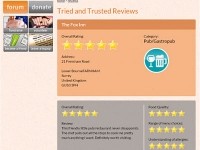Dietary requirements: Catering for customers with allergies and intolerances

Nowadays, many businesses – particularly larger chains – are a lot more proactive,with dietary information often available in-store and online, kitchens structured in a way to avoid cross-contamination, and food allergy and intolerance training courses available for staff.
But is that enough? Figures from Allergy UK indicate that food allergies are steadily rising in the UK population, now affecting around one million adults. And with many restaurants, hotels and pubs still missing out on an estimated £1m a year from the gluten-free market alone, it’s fair to say that more could still be done across the board, and that the potential financial benefits for the majority of businesses are not being realised.
As Anaphylaxis Campaign – the charity for severely allergic people in the UK – puts it: “Many large restaurant chains have in place, or are putting in place, the right procedures for providing the right information on ingredients and also ensuring absence of allergens in food – but there is variation in their state of preparedness.”
It is, of course, a highly sensitive area. During the week of writing this feature, a woman with coeliac disease was reported to have ‘nearly died’ after eating pasta at a Jamie’s Italian restaurant - she had asked staff three times for a gluten-free tagliatelle option. Jamie’s Italian Ltd will plead guilty next month to ‘selling food not of the nature and quality demanded by the purchaser’.
So the risks of catering for customers with strict dietary requirements are clear; a single moment of miscommunication between the front and back-of-house could have a devastating effect on a business’s reputation, not to mention the potentially fatal consequences for the affected customer.
Minor adjustments
Scared off? Don’t be. As long as your staff are aware of the allergies they are catering for and you have the right procedures in place across the business, you’ll realise that ‘allergies’ and ‘intolerances’ are not words to be feared, but instead to be welcomed and used as examples of your business’s devotion to its customer base.
So says Sarah Sleet, chief executive of Coeliac UK, which has been receiving an increasing number of enquiries from restaurants about how to offer more gluten-free options.
“There’s a fear of that initial hurdle - businesses are worried that something could go wrong, or that they would be criticised for their provision,” says Sleet. “But often what we’ll find is that a business already has the right procedures in place, there are just some minor adjustments or improvements that need to be made.”
Sleet’s view is echoed by Liz Allan - a hospitality business consultant who provides allergy training workshops for restaurants, hotels, pubs and catering companies.
“There’s a small proportion of restaurants that are doing a damn good job, but the mass population think that it’s too difficult and too scary an area to actually branch out into,” adds Allen. “But the reality is that it’s not a scary area.
“We’re not talking about converting a menu so that everything is allergy-friendly. If you offer just three or four items on a menu that exclude four of the top 14 allergens (more details in tomorrow’s feature) then that’s brilliant, you can market that.
“And then your staff need to know how to prepare the ingredients, how to avoid cross-contamination – which is just an extension of your food hygiene process.”
The extra mile
But why do anything at all? With the initial costs of implementing new menus, buying the correct food and equipment, and training staff – is it actually all worth it?
Juliette Joffe, the co-founder of Giraffe, believes the area of food intolerances and allergies should not be looked at on a purely tangible basis, but also with a sense of responsibility and obligation in mind.
“All restaurants have a responsibility to provide a basic level of understanding,” says Joffe. “There seems to be a huge amount of people with special requirements in some form or another nowadays, but that doesn’t mean they should be avoided, if anything quite the opposite – in some cases you will have to go the extra mile for them.”
While the Tesco buyout of Giraffe may have stolen the headlines for of late, the chain’s offering for customers with dietary requirements remains consistent; every restaurant has an allergy sheet which can be given to customers on request (and is also available online). The group also works closely with its suppliers to make sure the information they are providing is up-to-date, and its development chefs are on top of the latest developments.
“It sounds like a lot of work, but it’s not,” adds Joffe. There’s not a huge cost that goes into it – we put staff training in place across the group regardless, and we don’t change our menu too often, which gives us more confidence in the allergy sheets.
“At the end of the day, our ethos is to try and make every single one of our customers that walks through our doors happy. If you have happy customers, you get repeat business. So there is of course a positive financial aspect to it.”
Return on investment
Fellow casual dining chain Las Iguanas has also benefitted from repeat custom, having enhanced its gluten-free and vegetarian options, with separate menus available for each.
As the Latin American restaurant’s food & beverage manager Katie Chatterton explains: “We have a really big gluten-free customer base across the group, and a great vegetarian following as well.
“The long-term financial benefits definitely outweigh the initial costs. If you have one person in a group of ten who’ve got an allergy, they will be the person deciding where the other nine will eat, so it makes a lot of sense to try and cater for that person.
“You don’t have to totally restructure your kitchen, you’ve just got to be sensible about it; make sure all of your ingredients are separate and be fully aware of cross-contamination.
“You also don’t have to buy expensive ingredients, there are plenty of products out there that are naturally allergy-friendly anyway- it’s just a case of looking out for them.”
And it’s not just the big chains that are reaping the benefits by being more proactive.Cherin and Kim Marmon-Saxe, who own the Ravenstone Manor hotel in the Lake District, recently opened a new restaurant - Charlottes View At Ravenstone Manor - which is ’97 per cent gluten-free’, and will cater for any other dietary requirement.
Cherin, who herself has a gluten-free diet, explains: “The motivation has probably come out of me wanting to be able to eat everything on my own menu, but it’s been a great reason to get more people involved and create more awareness.
“We want to make our guests feel comfortable, like they don’t have to worry about what they’re putting in their mouth.”
Her partner Kim adds: “I don’t suffer from any allergies but the thing that I’ve always found is that there’s such a lack of variety for people that have allergies or intolerances. It’s such an easy way out to just offer lettuce leaves for someone who’s got something that’s a bit more challenging. That’s one of the things we specialise in, not only providing the same taste and flavour for everybody, but also the variety.”
As a result, Charlottes View At Ravenstone Manor has seen a huge upturn in the number of customers with coeliac disease and other dietary requirements, with word-of mouth generating a high proportion of repeat business.
Foot voting
As the number of potential customers with dietary requirements continues to rise, there will inevitably be a time when a hospitality business that does not cater for those requirements will be the anomaly, and could in fact see a decline in trade. Allergy-friendly review websites could be a catalyst for this shift.

For example, the Anaphylaxis Campaign recently developed a system for its members to share their experience, through a review directory called ‘Tried & Trusted’.
It’s members can input their reviews of the very best (and very worst) restaurants, pubs and hotels with regards to their allergy understanding. They tell others about their experiences and give each location a star rating according to a range of criteria, including how accommodating, understanding and savvy establishments were with when it came to their allergy requirements.
Other members can then log on and browse these reviews. If they don’t agree with what they see, they can add their own review.
“We hope that this system will become well used and populated with lots of reviews that our members will find really useful,” says Anaphylaxis Campaign's communications manager Sarah Berresford. “We also want to raise awareness of the system amongst caterers, with the aim they increase their customer care of their allergic customers.
“This would also be beneficial to the business, as positive reviews in Tried and Trusted may lead to increased business from our members.”
Food Information Regulation
If you’re still not convinced then perhaps it is also worth noting that catering for customers with dietary requirements and food intolerances could become the law.
Earlier this year, Defra has a consultation about the current state of the UK foodservice industry, which concluded with a set of Food Information Regulations. In principal, these regulations state that all hospitality businesses will have to have some dietary information on the menu, or readily available on-site, with relation to the top 14 allergens.
This has not been fully agreed as yet, but the FSA and Defra are currently working together for the regulations to be implemented at the end of December next year.
As Anna Holt, a nutritionist for hospitality purchasing experts Pelican Buying, concludes: “A high street chain will likely have the right processes and procedures in place to fit in with this proposed legislation, but looking at the smaller, independent businesses - do they have the same procedures? Unlikely.
“Businesses that aren’t doing enough should be thinking about this now. If they don’t feel a sense of responsibility and they fail to see the business benefits, then the Food Information Regulation will, at the very least, prompt action and change across the industry.”
Read and view all of our content on dietary requirements here.




























